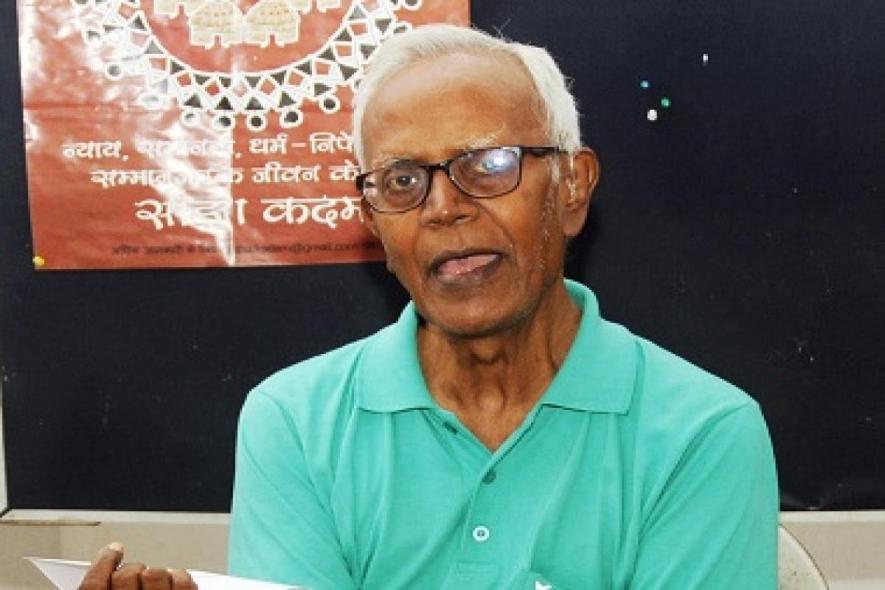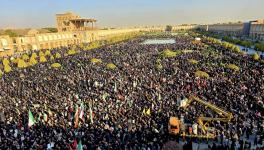Who is Really the Enemy of the People?

Image Courtesy: Sabrang India
Stan Swamy, a Jesuit priest and tribal rights activist, was arrested in Ranchi on 9 October. The National Investigation Agency (NIA), which carried out the arrest, claimed he was a member of the CPI (Maoist) organisation. It appears that anyone who works for Dalit rights, or is not in full agreement with the toxic ideology of the Sangh parivar, must be a Maoist.
Through the ten days that have passed since the arrest of the 83-year-old priest and activist, protests have been staged across the country. The latest one was in Ranchi on 17 October, where 5,000-odd people formed a human chain. The Jesuit organisation has deplored his arrest and asked for his release.
While claiming that Swamy was an active Maoist, the NIA also said he was in touch with a number of people already incarcerated by the government in connection with the peaceful and public Elgar Parishad meetings held in Pune on 31 December 2017. Swamy became the sixteenth person to be arrested in connection with the Elgar Parishad-Bhima Koregaon case.
A brief recapitulation of the case would help clarify the issues. The Elgar Parishad is an organisation of Dalit and human rights activists, which held meetings in Pune in which issues connected to Dalit rights and the oppression of Dalit communities were discussed, the Sangh parivar criticised and cultural programmes held. On 1 January 2018, the next day, Dalits met at Bhima-Koregaon village to celebrate the bicentenary of the victory of a Dalit Mahar unit, assisting a British regiment, in a battle against a Peshwa army. The Peshwa were Brahmins who were at that time at the helm of the Maratha Empire.
Thugs belonging to Hindutva groups attacked the Dalits. Violence broke out and continued over the next few days throughout Maharashtra. Two Hindutva leaders were thought at first to have orchestrated the attack—Milind Ekbote and Manohar Bhide, also known as Sambhaji and Guruji. FIRs were filed against both after a Pune Police committee found evidence that they had played a leading role in orchestrating the violence.
Bhide, who is close to the prime minister, was, curiously, never even questioned, while Ekbote was arrested only after the Supreme Court admonished the Pune police force for failing to carry out their duties. In a few months, however, the police dropped its investigation into the role of Hindutva agents provocateurs in fomenting the violence and manufactured a spurious Maoist connection with the Elgar Parishad events, going so far as to claim, laughably, a plot to assassinate the prime minister. As mentioned, 16 people have been arrested so far, among them academics, lawyers, activists and now a priest.
The Bhima-Koregaon case encapsulates certain key features of the authoritarian, majoritarian, obscurantist regime that now rules India. There is, of course, the systematic persecution of Muslims and Dalits, combined with the relentless repression of those who seek to represent their rights. This is part of the larger project of demonizing and persecuting those who challenge the regime, the Bharatiya Janata Party (BJP) and the Sangh parivar, with the Rashtriya Swayamsevak Sangh (RSS) at the heart of the spider’s web.
Dissent is being both criminalised and persecuted while a concurrent project of de-institutionalisation has been pursued from 2014. It involves the subversion of democratic and constitutional structures and values. Thus key institutions like the Election Commission, the Central Vigilance Commission, and judicial and law-enforcement agencies have been subverted or undermined.
The stated objective of the regime is to institute the complete dominance of one party. The unstated part is that this is a pit stop on the way to establishing a political system in which democratic rights will be purely contingent and human rights given short shrift at every point when they come into conflict with the objectives of the regime—the establishment of an authoritarian, Hindutva-dominated political order.
If these claims seem fanciful, one merely has to examine the record of the regime in Kashmir and the treatment meted out to migrant workers in the context of the outbreak of the Covid-19 pandemic. The latter established a kind of draconian benchmark for arbitrary, illegal violence inflicted by a government against its own citizens that can only be matched by formally authoritarian (and vindictive) states.
With the judiciary abdicating its role in establishing and protecting citizens’ rights, the current regime’s intolerance of dissent or scrutiny has only increased. The manner in which it has forced Amnesty International, the global human rights watchdog out of the country is of a piece with its arrogation to itself of the right to free itself of any criticism and constraint.
Amnesty was forced to announce the closure of its operations and offices in India on 29 September after all its accounts were frozen on 10 September by the Enforcement Directorate. About a month before the organisation was financially choked, Amnesty had published two reports.
One was on the situation in Jammu and Kashmir on the “occasion” of the passage of a year after the abrogation of the state’s special status on 5 August 2019. It was extremely critical, pointing to the detention of the BJP’s political opponents, the clampdown on the media and suspension of access to the internet. In the introduction, it demanded ‘the release of all political leaders, journalists and activists from administrative detention, restoration of 4G mobile internet services, decongestion of prisons and a prompt and independent investigation into the attacks on journalists’.
The other was in the context of the Delhi riots. This report documented human rights violations committed by the Delhi Police and the impunity it enjoyed. It said, “…this investigative briefing by Amnesty International India is not regarding the ongoing investigations by the Delhi police. This is about the Delhi police. As the Delhi police investigate who is responsible for the riots, there have been no investigations till now into the human rights violations committed by the Delhi police during the riots.”
It is not exactly a secret that as with the Bhima-Koregaon case, so in the case of the Delhi riots, the actual instigators, BJP leaders, and those predominantly responsible for committing murder and mayhem, Hindutva storm troopers, have until now faced practically no action, just as they got a free run in March, while Muslim youth, students, academics and others who had been protesting against the Citizenship (Amendment) Act, 2019, have been targeted by the Delhi police under the supervision of the Ministry of Home Affairs.
Amnesty operates in 70 countries. The only one in which it has had to shut its offices, apart from India, has been Russia, where it shut shop in 2016. The organisation has often been accused of pro-Western bias. But Amnesty’s biases or lack of them is not the point. The point is the way in which the current regime in India—run by the duumvirate of Prime Minister Narendra Modi and Union Home Minister Amit Shah—is dismantling constitutional democracy in India.
India is joining the growing ranks of illiberal democracies. It is becoming like Russia, Israel, Belarus and Pakistan—countries in which elections merely provide a veil for authoritarianism, repression and the attempt to destroy an open society. The problem with going down that road and being seen by the international community as going down that road is a loss of credibility.
India would obviously like to be part of the mesh of international alliances that includes the world’s democracies. India’s most salient allies look at India as one of the democratic bulwarks of the Global South. Charting a course away from that location would be a fraught project. We will have to look to forces within the country to steer back towards the path of constitutionalism and political processes that incorporate opposition, dissent and diversity.
The author is a freelance journalist and researcher. The views are personal.
Get the latest reports & analysis with people's perspective on Protests, movements & deep analytical videos, discussions of the current affairs in your Telegram app. Subscribe to NewsClick's Telegram channel & get Real-Time updates on stories, as they get published on our website.























